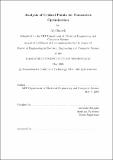| dc.contributor.advisor | Asuman Ozdaglar. | en_US |
| dc.contributor.author | Å imÅ ek, Alp | en_US |
| dc.contributor.other | Massachusetts Institute of Technology. Dept. of Electrical Engineering and Computer Science. | en_US |
| dc.date.accessioned | 2006-03-28T19:52:00Z | |
| dc.date.available | 2006-03-28T19:52:00Z | |
| dc.date.copyright | 2005 | en_US |
| dc.date.issued | 2005 | en_US |
| dc.identifier.uri | http://hdl.handle.net/1721.1/32108 | |
| dc.description | Thesis (M. Eng.)--Massachusetts Institute of Technology, Dept. of Electrical Engineering and Computer Science, 2005. | en_US |
| dc.description | This electronic version was submitted by the student author. The certified thesis is available in the Institute Archives and Special Collections. | en_US |
| dc.description | Includes bibliographical references (leaves 121-125). | en_US |
| dc.description.abstract | In this thesis, we establish sufficient conditions under which an optimization problem has a unique local optimum. Motivated by the practical need for establishing the uniqueness of the optimum in an optimization problem in fields such as global optimization, equilibrium analysis, and efficient algorithm design, we provide sufficient conditions that are not merely theoretical characterizations of uniqueness, but rather, given an optimization problem, can be checked algebraically. In our analysis we use results from two major mathematical disciplines. Using the mountain pass theory of variational analysis, we are able to establish the uniqueness of the local optimum for problems in which every stationary point of the objective function is a strict local minimum and the function satisfies certain boundary conditions on the constraint region. Using the index theory of differential topology, we are able to establish the uniqueness of the local optimum for problems in which every generalized stationary point (Karush-Kuhn-Tucker point) of the objective function is a strict local minimum and the function satisfies some non-degeneracy assumptions. The uniqueness results we establish using the mountain pass theory and the topological index theory are comparable but not identical. | en_US |
| dc.description.abstract | (cont.) Our results from the mountain pass analysis require the function to satisfy less strict structural assumptions such as weaker differentiability requirements, but more strict boundary conditions. In contrast, our results from the index theory require strong differentiability and non-degeneracy assumptions on the function, but treat the boundary and interior stationary points uniformly to assert the uniqueness of the optimum under weaker boundary conditions. | en_US |
| dc.description.statementofresponsibility | by Alp Simsek. | en_US |
| dc.format.extent | 125 leaves | en_US |
| dc.format.extent | 1876940 bytes | |
| dc.format.extent | 1831347 bytes | |
| dc.format.mimetype | application/pdf | |
| dc.format.mimetype | application/pdf | |
| dc.language.iso | eng | en_US |
| dc.publisher | Massachusetts Institute of Technology | en_US |
| dc.rights | M.I.T. theses are protected by copyright. They may be viewed from this source for any purpose, but reproduction or distribution in any format is prohibited without written permission. See provided URL for inquiries about permission. | en_US |
| dc.rights.uri | http://dspace.mit.edu/handle/1721.1/7582 | |
| dc.subject | Electrical Engineering and Computer Science. | en_US |
| dc.title | Analysis of critical points for nonconvex optimization | en_US |
| dc.type | Thesis | en_US |
| dc.description.degree | M.Eng. | en_US |
| dc.contributor.department | Massachusetts Institute of Technology. Department of Electrical Engineering and Computer Science | |
| dc.identifier.oclc | 62413560 | en_US |
